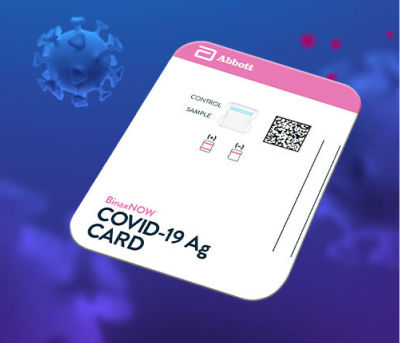 This story was written and produced by NJ Spotlight. It is being republished under a special NJ News Commons content-sharing agreement related to COVID-19 coverage. To read more, visit njspotlight.com.
This story was written and produced by NJ Spotlight. It is being republished under a special NJ News Commons content-sharing agreement related to COVID-19 coverage. To read more, visit njspotlight.com.
New Jersey could nearly double its daily coronavirus testing capacity in the weeks to come thanks to a federal pledge to provide the state 2.6 million rapid-result antigen tests at no cost.
On Monday, Gov. Phil Murphy announced that the White House had committed to sending the first batch of 170,000 BinaxNOW tests within two weeks with additional shipments slated to follow over the next three months.
The BinaxNOW process — which involves a less-invasive nasal swab than the common viral test — can reveal if an individual is currently infected with COVID-19 in just 15 minutes, Murphy said. State and local officials are working on a plan to distribute the new test kits, which he said would target vulnerable and underserved populations, frontline workers, students and school staff, and other groups.
“This could be a game changer,” Murphy said during his regular media briefing, noting that some of the new tests will be deployed to help with “keeping the economy open.”
With 712 new COVID-19 cases announced by state officials Monday — nearly 40% from Ocean County alone — more than 203,500 New Jerseyans have been diagnosed with the disease since March, including at least 14,300 who have died. While the state has begun to reopen nonessential businesses, they remain at limited capacity, and most schools are still operating remotely to reduce the chances of viral spread.
New Jersey currently depends largely on dozens of local and county-run testing programs that use viral, or PCR, tests to diagnose an existing infection. Department of Health Commissioner Judy Persichilli said up to 35,000 of these are being administered daily. These tests generally involve a deep nasal cavity or throat swab, which is sent to a lab to determine if the sample contains any COVID-19 genetic material — a process that can take several days to a week or more.
The antigen test: What’s involved
Antigen tests like BinaxNOW, developed by Abbott Labs, are designed to detect COVID-19 molecules that trigger a human immune response, specifically the creation of antibodies that work to kill the virus. The Binax process involves an outer-nose swab that is swiped on a credit card-like device that is then processed onsite to quickly determine if an individual is currently infected with coronavirus.
A third form of test, to detect antibodies themselves, can indicate if an individual has contracted COVID-19 in the past — but this doesn’t mean the person is currently infected and experts are still studying whether the presence of these antibodies protects people long-term. While antibody tests are available at health care facilities, the state has shied away from this screening process in its public testing program or at state-run facilities, like nursing homes and prisons, largely because of concerns about the accuracy of results.
Persichilli said the Binax antigen test is highly accurate, with a sensitivity rate (or correct positive result) of more than 97% and a specificity (or accurate negative outcome) of 98.5%, based on a clinical trial of 102 people. The process requires no special equipment and the state is getting the kits for free, she said.
While antibody tests are limited in some ways, Persichilli noted they are useful for epidemiological studies like one underway by the federal government. The federal Centers for Disease Control and Prevention recently released data that indicated roughly 9% of Americans have been infected at some point. The survey involved samples from 28,500 dialysis patients and data was adjusted to reflect the nation’s demographics, according to medical journal The Lancet.
On Monday Persichilli said the first round of CDC results, reflecting testing from early July through mid-August, found New Jersey’s calculated antibody level was 14.7% — the second-highest in the country, after New York. (Later data published by The Lancet showed New Jersey closer to 12%, the sixth-highest rate nationwide; at 33.5%, New York remained at the top). It is not clear if the findings are truly representative however, Persichilli warned, since the samples may have been taken from a hard-hit area of the state and not reflect the true picture of the disease statewide.
“At this time there is a lot we don’t know about serology,” Persichilli added, noting that — with a new disease — scientists have yet to confirm how effectively the existence of antibodies can protect an individual against future infection. There also could be “false positives” found among individuals have been infected with a previously known form of coronavirus, which can cause cold-like symptoms, she noted.
“But we do know that a sero-prevalance of 15% is not sufficient for community protection,” or so-called herd immunity, Persichilli said. While estimates range greatly depending on the contagion, experts suggest that between 50% and 90% of the population needs to become immune — via vaccination or past infection — before community spread of a disease will decline on its own, without other interventions.

